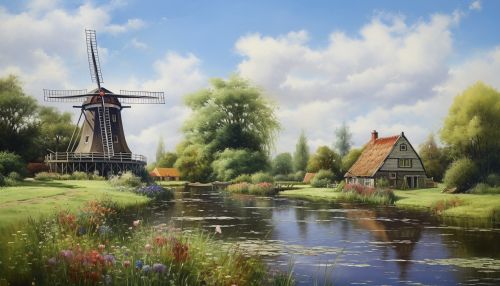Netherlands
Geography
The Netherlands, a country located in Northwestern Europe, is known for a flat topography characterized by extensive coastal plains and river deltas. The country's geographical location has significantly influenced its history and culture, shaping its distinct identity among European nations.


The Netherlands is bordered by Germany to the east, Belgium to the south, and the North Sea to the northwest, with maritime borders in the North Sea with those countries and the United Kingdom. It is one of the world's most densely populated countries.
Climate
The Netherlands has a temperate maritime climate, with mild summers and cool winters. The climate is influenced by the North Sea and the Atlantic Ocean, especially in areas closer to the sea. The inland areas tend to have slightly more continental climate, with colder winters and warmer summers.
History
The history of the Netherlands is a tale of constant struggle against water. The country's history begins with the Romans, who built the first settlements in the area. The Middle Ages saw the rise of powerful city-states and trading networks. The Dutch Golden Age in the 17th century is considered the pinnacle of Dutch cultural, economic, and military influence.
Dutch Golden Age
The Dutch Golden Age was a period in Dutch history, roughly spanning the 17th century, in which Dutch trade, science, and art were among the most acclaimed in the world. The Dutch Golden Age was also a time of rapid advancements in technology and the establishment of overseas colonies.
Economy
The Netherlands has a developed economy and has been playing a special role in the European economy for many centuries. The country is one of the world's top 10 exporting countries. Foodstuffs form the largest industrial sector. Other major industries include chemicals, metallurgy, machinery, electrical goods, and tourism. Examples include Unilever, Heineken, financial services (ING), chemicals (DSM), petroleum refining (Shell), electronic machinery (Philips, ASML), and car navigation (TomTom).
Agriculture and Fishing
The Netherlands is the world's second-largest exporter of food and agricultural products, after the United States. This is due to the fertility of the soil and the mild climate. The country's intensive farming is notable for its innovative use of technology and sustainable practices.
Fishing remains an important business; the country's fishing fleet is one of the most modern in the world.
Culture
The culture of the Netherlands is diverse, reflecting regional differences as well as the foreign influences built up by centuries of the Dutch people's mercantile and explorative spirit. The Netherlands and its people have long played an important role as centre of cultural liberalism and tolerance.
Dutch Art
Dutch art has a long history, starting from the 16th century. The Dutch Golden Age is particularly noted for its painting, especially the works of the "Dutch Masters" such as Rembrandt, Vermeer and Van Gogh.
Education and Science
The Netherlands has a binary education system, which means that students can choose between an academic education or a vocational one. The country is home to some of the world's top universities, such as the University of Amsterdam, Leiden University, and Utrecht University.
The Netherlands has a strong tradition in science and scholarship, and counts several Nobel Prize winners among its citizens. The country is also home to multinational corporations that are leaders in their respective fields, such as Royal Dutch Shell and Unilever.
